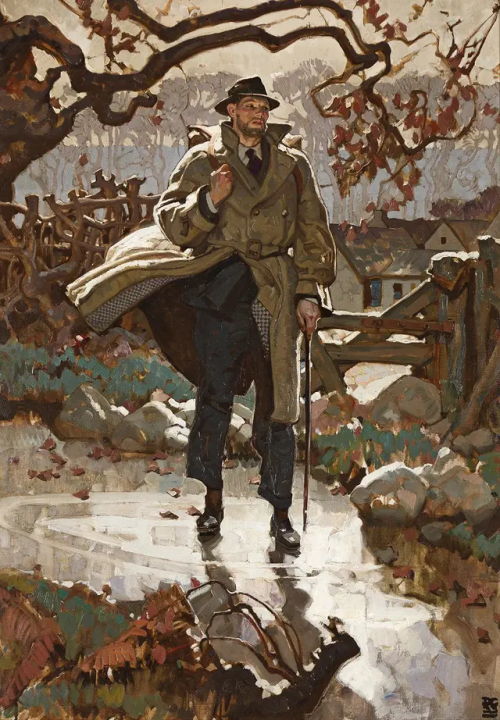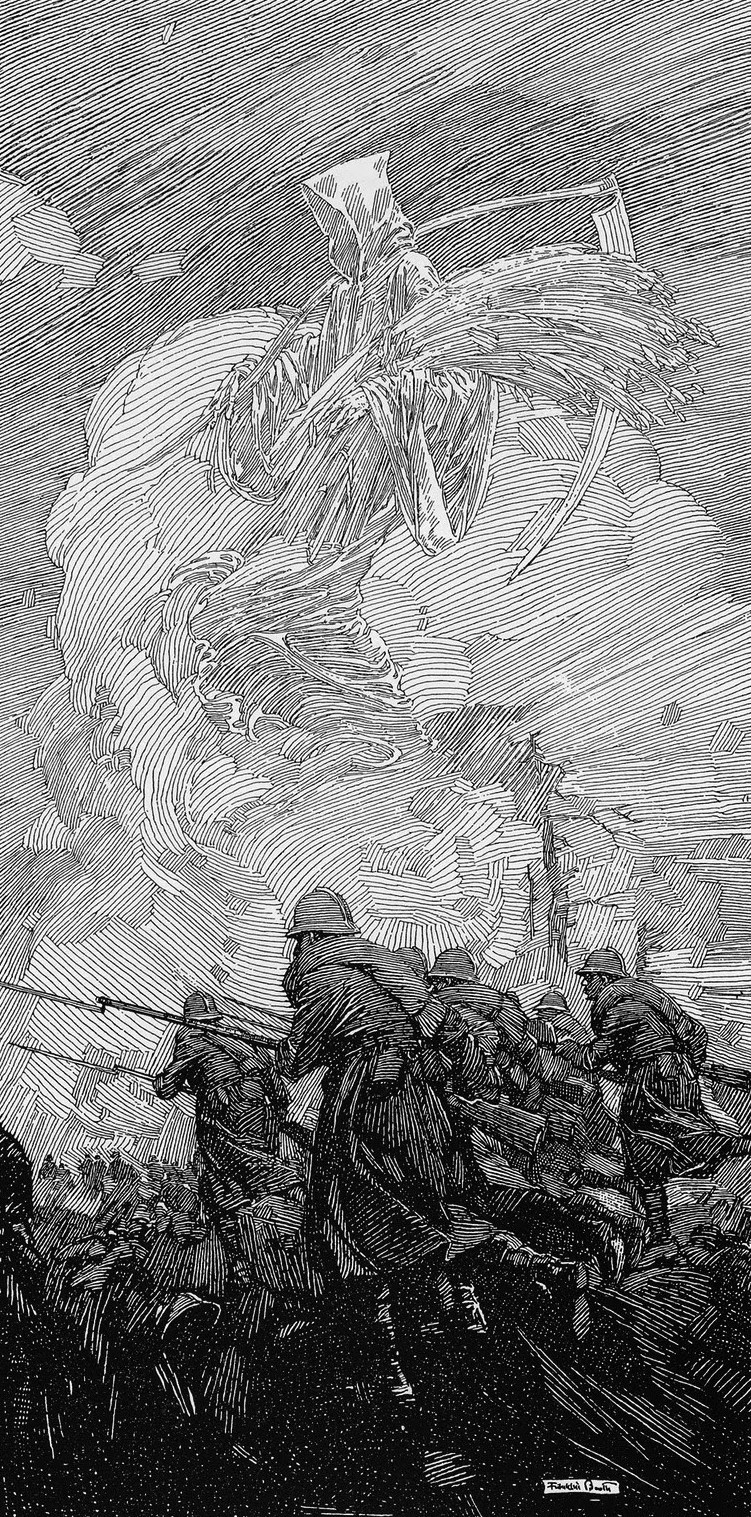World War I - Blog Posts
If you think about it, since the Final War is an alternate World War I, and because Russia never pulled out of conflict in ULTRAKILL's timeline, this could mean that the Russian Civil War likely lasted about a month, assuming the Guttermen were created around the time of the Russian Revolution.
I have no doubt that the surrendering Bolsheviks would eventually find themselves being used as fuel sources for their machines.
Yes, this includes Vladamir Lenin (Vladimir Ilyich Ulyanov), the founder and leader of the Bolsheviks, who later became the first head of the Soviet Union in our own universe.

The Body Survived The Mind Did Not

Dean Cornwell - "Sherring followed the lane with the tramp's air of alertness." Story illustration for Part V of "Seven Men Came Back" by Warrick Deeping, published in Cosmopolitan, February, 1934
It puzzles me when people cite LOTR as the standard of “simple” or “predictable” or “black and white” fantasy. Because in my copy, the hero fails. Frodo chooses the Ring, and it’s only Gollum’s own desperation for it that inadvertently saves the day. The fate of the world, this whole blood-soaked war, all the millennia-old machinations of elves and gods, comes down to two addicts squabbling over their Precious, and that is precisely and powerfully Tolkien’s point.
And then the hero goes home, and finds home a smoking desolation, his neighbors turned on one another, that secondary villain no one finished off having destroyed Frodo’s last oasis not even out of evil so much as spite, and then that villain dies pointlessly, and then his killer dies pointlessly. The hero is left not with a cathartic homecoming, the story come full circle in another party; he is left to pick up the pieces of what was and what shall never be again.
And it’s not enough. The hero cannot heal, and so departs for the fabled western shores in what remains a blunt and bracing metaphor for death (especially given his aged companions). When Sam tells his family, “Well, I’m back” at the very end, it is an earned triumph, but the very fact that someone making it back qualifies as a triumph tells you what kind of story this is: one that is too honest to allow its characters to claim a clean victory over entropy, let alone evil.
“I can’t recall the taste of food, nor the sound of water, nor the touch of grass. I’m naked in the dark. There’s nothing–no veil between me and the wheel of fire. I can see him with my waking eyes.”
So where’s this silly shallow hippie fever-dream I’ve heard so much about? It sounds like a much lesser story than the one that actually exists.
after literal years i finally got around to downloading a pdf of the wipers times, an unsancitioned satitical british trench magazine circulated among the troops in france from 1916-1918 after the fortuitous discovery of a printing press. i have approximately five million other things i need to read so idk when i'll be able to devote much time to it, and i gotta pick up a proper copy bc it's missing at least salient no 4 vol 2. that said? i'm genuinely laughing at what i've skimmed so far


Dan Smith “Knowledge Wins” World War I Propaganda Poster (American Library Association, 1918) Source
Still true today. We need smart people to get us out of this mess, same then as now.



























Pastel portraits of wounded soldiers by Henry Tonks
As someone who has an interest in sf/fantasy depictions of WWI, I’ve been puzzling for years as to why authors dabbling in steampunk have been reluctant to tackle the conflict. My own theory is that steampunk is, at heart, an American creation, and the Great War is an event that has mostly vanished from the American consciousness. For most American writers, steampunk is a fantasy world set in an imagined version of 19th-century Britain or America which draws more from other stories than from reality, and the question of international politics and war doesn’t really come into it. That said, I have found British authors working in steampunk to be far more willing to broach the subject of World War I, both because the war had such a huge impact on the British national psyche, and because it ties into the greater question of what Britain is, its relationship to the empire, what role Britain has in the world after empire, and so on. As for examples, two authors stand out to me. While a hard sf writer by trade, Stephen Baxter’s steampunk excursions always seem to be haunted by the war. His 1993 novel Anti-Ice is for the most part a romp about a 19th-century excursion from the Earth to the Moon thanks to the titular substance, an exotic form of antimatter. However, by the end of the book the use and exploitation of anti-ice has led to Britain, France, and Germany locking themselves into a Cold War-style nuclear arms race. His 1995 book The Time Ships is a sequel to the The Time Machine that riffs in all manner of ways on HG Wells’ work, but the middle third of the book is set in an alternate 1938 where the First World War has dragged on for decades, transforming Britain into a dystopian state influences by Wells’ most pessimistic views. (While I haven’t read Baxter’s 2017 followup to The War of the Worlds, entitled The Massacre of Mankind, some of the elements I’ve seen, like a police-state Britain and a bloody Russo-German war in Eastern Europe, suggests that the Martian invasion of the original book has become the Great War of the sequel’s world.) For something a little more literary, Ian R. MacLeod’s Aether duology, The Light Ages (2003) and The House of Storms (2005), is set in an England where a magical substance called “aether” has locked the country (and by extension the rest of the world) in a sort of static industrial revolution for centuries in some ways reminiscent of Keith Roberts’ Pavane (1968). Change does eventually come to this static eternal England, sadly in the form of a civil war whose depiction draws heavily from that of the Western Front.
I didn’t include it in the list of favorite stories because I like it more in idea than in execution, but Caitlin R, Kiernan’s story Goggles really hit me hard. She says it was her idea of where all steampunk is leading, but most authors don’t want to admit: the conflict that became World War I in our world destroys the steampunk world in technologically advanced nuclear fire. I read it yesterday and I can’t get the concept out of my head.
